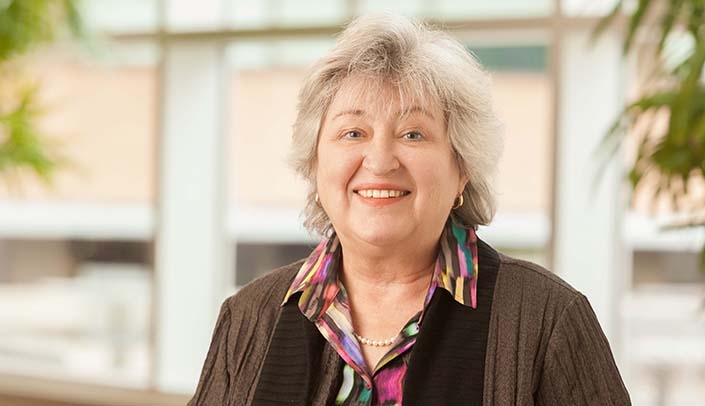Susan Swindells, MBBS, professor in the UNMC Department of Internal Medicine, co-chaired a landmark study for new treatments for tuberculosis.
Results indicate that a four-month daily treatment regimen is as safe and effective as the existing standard six-month daily regimen at curing drug-susceptible tuberculosis disease.
Results from the international, randomized, controlled clinical trial were presented recently during the virtual 51st Union World Conference on Lung Health and soon will be submitted for publication.
“The regimen is the first successful short-course treatment regimen for drug-susceptible TB disease in almost 40 years,” Dr. Swindells said. “The availability of shorter regimens enables patients to be cured faster, and has the potential to reduce treatment costs, improve patient quality of life, increase completion of therapy and reduce development of drug resistance.”
TB is one of the most important global health problems. According to recent estimates from the World Health Organization, 10 million new TB cases and 1.4 million deaths from TB occurred globally in 2019. While the United States has achieved substantial progress in reducing TB, with fewer than 10,000 cases each year, too many people still suffer from the disease.
The Phase 3, open-label trial, called Study 31/A5349, was led by the U.S. Centers for Disease Control and Prevention’s Tuberculosis Trials Consortium. Collaborators include the AIDS Clinical Trials Group funded by the National Institute of Allergy and Infectious Diseases, part of the National Institutes of Health. It is the largest drug-susceptible TB disease treatment trial that CDC or NIAID has ever conducted, with more than 2,500 participants ages 12 and older enrolled at 34 clinical sites in 13 countries. The trial included 214 people with HIV.
The study examined the effectiveness and safety of two, four-month regimens with rifapentine with or without moxifloxacin. These were compared with the existing six-month regimen, which includes eight weeks of daily treatment with rifampin, isoniazid, pyrazinamide and ethambutol and 18 weeks of daily treatment with rifampin and isoniazid.
At the conclusion of the trial, the four-month regimen with rifapentine and moxifloxacin met non-inferiority criteria for effectiveness in all of the several planned analyses and was safe and well-tolerated. The second new regimen with rifapentine did not meet non-inferiority criteria when compared to the existing standard regimen.
“This new regimen represents a major milestone and will make a big difference to TB programs around the world, and the millions of affected people,” Dr. Swindells said, “I am proud to have been a part of it and proud that UNMC was involved.”
